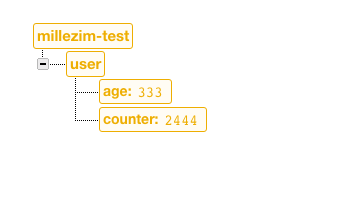I use Firebase to handle the Auth topic of my Android app. I also save a user profile on Firebase, that contain user id and extra options that user can update in the android app.
At startup, the app check the auth, and auth. It reload the user profile (on Firebase) to then update my userInstance on the app.
Firebase is set as offline capable at app level. The userInstance POJO is sync with Firebase at log and stop to be sync at unlog.
I have a special parameter, in my user profile that I can change (as an admin).
Every-time I update it on the Firebase console, it is replaced by the previous value when the app start again.
How can this happen ?
BTW : 1/ Based on which mechanism are the data merged, if multiple client have different local values ?
Here is simpler code, where I tried to reproduce the error. :
MyApplication.java
public class MyApplication extends Application {
@Override
public void onCreate() {
super.onCreate();
Firebase.setAndroidContext(this);
Firebase.getDefaultConfig().setLogLevel(Logger.Level.DEBUG);
Firebase.getDefaultConfig().setPersistenceEnabled(true);
}
}
MainActivity
public class MainActivity extends AppCompatActivity {
Firebase ref;
User user;
@Override
protected void onCreate(Bundle savedInstanceState) {
super.onCreate(savedInstanceState);
setContentView(R.layout.activity_main);
ref = new Firebase("https://millezim-test.firebaseIO.com").child("user");
ref.keepSynced(true);
Button br = (Button) findViewById(R.id.b_read);
Button bs = (Button) findViewById(R.id.b_save);
final TextView tv_r = (TextView) findViewById(R.id.tv_value_toread);
final EditText tv_s = (EditText) findViewById(R.id.tv_value_tosave);
user = new User();
bs.setOnClickListener(new View.OnClickListener() {
@Override
public void onClick(View v) {
if (!tv_s.getText().toString().equalsIgnoreCase(""))
user.setAge(Integer.valueOf(tv_s.getText().toString()));
ref.setValue(user);
}
});
br.setOnClickListener(new View.OnClickListener() {
@Override
public void onClick(View v) {
ref.addListenerForSingleValueEvent(new ValueEventListener() {
@Override
public void onDataChange(DataSnapshot dataSnapshot) {
User u = dataSnapshot.getValue(User.class);
if (u != null)
tv_r.setText(String.valueOf(u.getAge()));
else
tv_r.setText("Bad Value");
}
@Override
public void onCancelled(FirebaseError firebaseError) {
}
});
}
});
ref.addValueEventListener(new ValueEventListener() {
@Override
public void onDataChange(DataSnapshot dataSnapshot) {
User u = dataSnapshot.getValue(User.class);
u.setCounter(u.getCounter() + 1);
user = u;
saveUser();
}
@Override
public void onCancelled(FirebaseError firebaseError) {
}
});
}
public void saveUser() {
ref.setValue(user);
}
}
If you just change a value in the app, then the counter inc until the app stop : this is normal. But what is strand is the age pass from old to new then to old cyclically without stopping.
And I feel that behavior in my app, without the cyclic, as I do not have a counter, but I cannot change a parameter in the admin client, I always get back the previous value stored in the mobile.
I just Auth, then I update my UserInstance with AuthData + the User fetch from Firebase (probably the cached data), and then I save back the updated User under Firebase (As I may got new AuthData, and I normally get the latest User from Firebase)
2/ In this simple example, I saw that if I read the value at start, it fetch the data cached in the app. How can I force having online data ?

